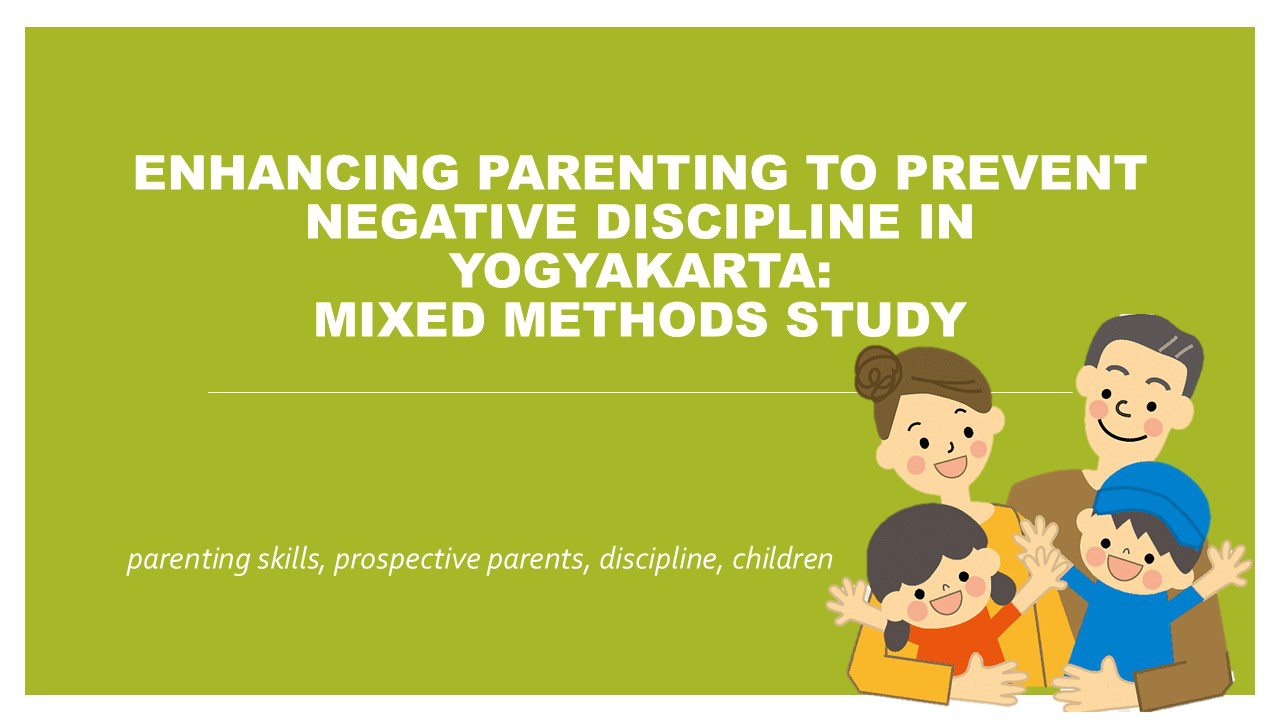Enhancing Parenting to Prevent Negative Discipline in Yogyakarta: Mixed Methods Study
DOI:
https://doi.org/10.23917/bik.v18i2.8808Keywords:
Parenting Skills, Prospective Parents, Negative Discipline, ChildrenAbstract
Data show that 60% of children aged 2 to 14 have experienced physical punishment from their parents. Based on data from the Simfoni PPA KemenPPPA (Online Information System for the Protection of Women and Children), in 2023, there were 29,884 cases of violence recorded throughout Indonesia. Objective: This study aimed to enhance the parenting skills of prospective parents in the Bantul region to prevent the use of negative disciplinary methods on children. This study employed a mixed-methods design with a Sequential Explanatory approach. The quantitative phase used a pre-experimental design with a one-group pretest-posttest design, involving 37 prospective parents as the sample. The qualitative phase utilised Participatory Action Research, recruiting a sample of 5 couples of prospective parents, 2 counsellors, and 1 policy maker. The average attitude score of prospective parents before the intervention was 62.11, which increased to 80.38 after the intervention. A significant p-value of 0.000 < 0.05 indicates the rejection of the null hypothesis. This implies that the intervention concerning negative disciplinary measures on children has a significant impact on the attitudes of prospective parents. Conclusion: Several challenges faced by prospective parents in enhancing parenting skills include a lack of experience in child-rearing, mental unpreparedness for parenthood, and limited time due to work and other activities. The government needs to formulate policies that encourage positive parenting approaches and non-violent discipline, and launch awareness campaigns to educate the public about the dangers of negative disciplinary measures and the importance of positive parenting methods.
Downloads
References
Astuti, A. W., Hirst, J., & Bharj, K. K. (2020). Indonesian adolescents’ experiences during pregnancy and early parenthood: a qualitative study. J. Psychosom. Obstet. Gynecol, 41(4), 317–326. https://doi.org/10.1080/0167482X.2019.1693538
Azizah, S. N., Saleh, S., & Sulistyaningrum, E. (2022). The Effect of Working Mother Status on Children’s Education Attainment: Evidence from Longitudinal Data. Economies, 10(2), 1–22. https://doi.org/10.3390/economies10020054
Bailey, S., Hurley, J., Plummer, K., & Hutchinson, M. (2022). Parenting interventions targeting early parenting difficulty: A scoping review. J. Child Heal. Care, 28(2), 429–450. https://doi.org/10.1177/13674935221116696
Bappeda. (2021a). Jumlah Kekerasan Terhadap Perempuan Dan Anak Menurut Kelompok Umur dan Lokasi. Jogja Dataku.
Bappeda. (2021b). Pemberdayaan Perempuan dan Perlindungan Anak. Jogja Dataku.
Barongo, V., Kiwale, Z., Shayo, E., Fabbri, C., Turner, E., Bakari, M., Mubyazi, G., Rodrigues, K., & Devries, K. (2024). Conceptualisation of violence and discipline among students, teachers, and parents in Nyarugusu Refugee Camp, Tanzania. Child Abuse Negl, 149, 106555. https://doi.org/https://doi.org/10.1016/j.chiabu.2023.106555
Bengtsson, S., & Johansson, S. (2022). The Meanings of Social Media Use in Everyday Life: Filling Empty Slots, Everyday Transformations, and Mood Management. Soc. Media Soc, 8(4). https://doi.org/10.1177/20563051221130292
Bush, N. R., Wakschlag, L. S., LeWinn, K. Z., Hertz-Picciotto, I., Nozadi, S. S., Pieper, S., Lewis, J., Biezonski, D., Blair, C., Deardorff, J., Neiderhiser, J. M., Leve, L. D., Elliott, A. J., Duarte, C. S., Lugo-Candelas, C., O’Shea, T. M., Avalos, L. A., Page, G. P., & Posner, J. (2020). Family Environment, Neurodevelopmental Risk, and the Environmental Influences on Child Health Outcomes (ECHO) Initiative: Looking Back and Moving Forward. Front. Psychiatry, 11, 547. https://doi.org/10.3389/fpsyt.2020.00547
Candan, H. D., & Dogan, S. (2023). Effectiveness of the positive discipline program applied to parents of preschool children: A randomized-controlled trial. J. Pediatr. Nurs, 72, e87–e97. https://doi.org/10.1016/j.pedn.2023.06.013
Carroll, P. (2022). Effectiveness of Positive Discipline Parenting Program on Parenting Style, and Child Adaptive Behavior. Child Psychiatry Hum Dev, 53(6), 1349–1358. https://doi.org/10.1007/s10578-021-01201-x
Creswell, J. W. (2019). Research Design Pendekatan Kualitatif, Kuantitatif, Dan Mixed. Pustaka Pelajar.
Cueli, M., Martín, N., Cañamero, L. M., Rodríguez, C., & González-Castro, P. (2024). The Impact of Children’s and Parents’ Perceptions of Parenting Styles on Attention, Hyperactivity, Anxiety, and Emotional Regulation. Children (Basel, Switzerland), 11(3). https://doi.org/10.3390/children11030313
Drzymalla, E., Crider, K. S., Wang, A., Marta, G., Khoury, M. J., & Rasooly, D. (2023). Epigenome-wide association studies of prenatal maternal mental health and infant epigenetic profiles: a systematic review. Transl. Psychiatry, 13(1). https://doi.org/10.1038/s41398-023-02620-1
Febrianti, C. P., & Astuti, A. W. (2022). Outcomes of Teenage Pregnancy in Developing Countries: A Scoping Review. J. Aisyah J. Ilmu Kesehat, 7(1), 337–346. https://doi.org/10.30604/jika.v7i1.1066
Ganapathy, S. S., Sooryanarayana, R., Mohammad, N. M., & Abdul Manaf, R. (2022). Practice of Disciplinary Methods and Factors Associated With Belief for Physical Punishment Among Malaysian Parents: Findings From NHMS 2016. Global Pediatric Health, 9(January-Desember). https://doi.org/10.1177/2333794X221113820
Halloran, E. C. (2020). Chapter 2 - Positive approaches to parenting and discipline: evidence-based, century old ideas still not used enough (M. B. T.-C. T. for C. B. H. Knox (ed.); pp. 21–55). Academic Press. https://doi.org/https://doi.org/10.1016/B978-0-12-816024-4.00002-4
Heilmann, A., Mehay, A., Watt, R. G., Kelly, Y., Durrant, J. E., van Turnhout, J., & Gershoff, E. T. (2021). Physical punishment and child outcomes: a narrative review of prospective studies. Lancet, 398(10297), 355–364. https://doi.org/https://doi.org/10.1016/S0140-6736(21)00582-1
Hughes, K., Ford, K., Bellis, M. A., & Amos, R. (2022). Parental Adverse Childhood Experiences and Perpetration of Child Physical Punishment in Wales. Int. J. Environ. Res. Public Health, 19(19). https://doi.org/10.3390/ijerph191912702
Kamis, C. (2021). The Long-Term Impact of Parental Mental Health on Children’s Distress Trajectories in Adulthood. Soc. Ment. Health, 11(1), 54–68. https://doi.org/10.1177/2156869320912520
Kelty, N. E., & Wakabayashi, T. (2020). Family Engagement in Schools: Parent, Educator, and Community Perspectives. SAGE Open, 10(4). https://doi.org/10.1177/2158244020973024
Khan, J. (2020). Socio-Cultural Factors Contributing to Parenting Styles and Parents-Adolescents Relationship : The Mediating Role of Authoritarian Parenting Internalizing Problems in Young Couple Harmony and Marital Adjustment. August. https://doi.org/10.13140/RG.2.2.30733.56801
Kiling-Bunga, B. N., Margiani, K., & Kiling, I. Y. (2020). Parenting Research in Indonesia: What We Have Done So Far. Buletin Psikologi, 28(1), 59. https://doi.org/10.22146/buletinpsikologi.51578
Kundre, R., & Bataha, Y. (2019). Hubungan Pola Asuh Orang Tua Bekerja Dengan Perkembangan Anak Usia Prasekolah (4 - 5 Tahun) Di Tk Gmim Bukit Moria Malalayang. J. Keperawatan, 7(1), 1–9. https://doi.org/10.35790/jkp.v7i1.25202
Kuppens, S., & Ceulemans, E. (2019). Parenting Styles: A Closer Look at a Well-Known Concept. J Child Fam Stud, 28(1), 168–181. https://doi.org/10.1007/s10826-018-1242-x
Kurniati, N., Fitriahadi, E., Rokhmah, I., & Sugiantoro, H. A. (2023). Islamic parenting education in the success of the ’Aisyiyah of love children movement. Community Empower, 8(4), 534–539. https://doi.org/10.31603/ce.6923
Li, B. (2023). Emerging Media: Opening a New Era in Future Communication. Emerging Media, 1(1), 5–8. https://doi.org/10.1177/27523543231205343
Logan, M. K., Windisch, S., & Simi, P. (2024). Adverse Childhood Experiences (ACE), Adolescent Misconduct, and Violent Extremism: A Comparison of Former Left-Wing and Right-Wing Extremists. Terror. Polit. Violence, 36(1), 55–74. https://doi.org/10.1080/09546553.2022.2098725
Lu, J., Huang, Y., & Chen, J. (2023). Parental Knowledge, Preference and Needs of Child-Rearing Family Programmes: A Case in Chinese Inner Mongolia Minority Region. Int. J. Environ. Res. Public Health, 20(1). https://doi.org/10.3390/ijerph20010434
Ma, J., Han, Y., & Kang, H. R. (2022). Physical punishment, physical abuse, and child behavior problems in South Korea. Child Abuse & Neglect, 123, 105385. https://doi.org/https://doi.org/10.1016/j.chiabu.2021.105385
Millroth, P. (2021). Toward a richer understanding of human cognition: Unleashing the full potential of the concurrent information-processing paradigm. New Ideas Psychol, 63(April), 100873. https://doi.org/10.1016/j.newideapsych.2021.100873
Mowen, T. J., Brent, J. J., & Boman, J. H. 4th. (2020). The Effect of School Discipline on Offending across Time. Justice Quarterly : JQ, 37(4), 739–760. https://doi.org/10.1080/07418825.2019.1625428
Nafisah, K. D., & Astuti, A. W. (2023). Association Between Adolescent Pregnancy and Stunting Incidence: A Scoping Review. J. Promosi Kesehat. Indones, 19(1), 42–49. https://doi.org/10.14710/jpki.19.1.42-49
Ndengeyingoma, A., Jacob, M. H., Beaulieu-Kratchanov, V., & Séguin, M. (2022). Parenting Competencies Supporting the Development of Social and Emotional Skills of Children—a Scoping Review. Trends Psychol. https://doi.org/10.1007/s43076-022-00194-3
Neaverson, A., Murray, A. L., Ribeaud, D., & Eisner, M. (2022). Disrupting the Link between Corporal Punishment Exposure and Adolescent Aggression: The Role of Teacher-Child Relationships. J Youth Adolesc, 51(12), 2265–2280. https://doi.org/10.1007/s10964-022-01666-6
Nugroho, D. A., & Cahyanti, I. Y. (2023). Psikoedukasi Positive Parenting pada Pendamping dan Pembina UPTD KANRI Surabaya. Ideas J. Pendidikan, Sos. Dan Budaya, 9(1), 9. https://doi.org/10.32884/ideas.v9i1.1172
Ofoha, D., Ogidan, R., & Saidu, R. (2019). Child discipline and violence in Nigeria: A community-based intervention programme to reduce violent discipline and other forms of negative parenting practices. Review of Education, 7(3), 455–492. https://doi.org/10.1002/rev3.3128
Pakpahan, M., Siregar, D., Susilawaty, A., Tasnim, Mustar, Ramdany, R., Manurung, E. I., Sianturi, E., Tompunu, G., M. R., & Sitanggang, Y. F., & M. (2021). Promosi Kesehatan & Prilaku Kesehatan. In Jakarta: EGC.
Rahmah, N., & Kurniawati, W. (2021). Relationship between marriage readiness and pregnancy planning among prospective brides. J Public Health Res, 10, 88–93. https://doi.org/10.4081/jphr.2021.2405
Refaeli, L. B., Rodrigues, M., Neaman, A., Bertele, N., Ziv, Y., Talmon, A., & Enav, Y. (2024). Supporting the transition to parenthood: a systematic review of empirical studies on emotional and psychological interventions for first-time parents. Patient Educ. Couns, 120, 108090. https://doi.org/https://doi.org/10.1016/j.pec.2023.108090
Rokhmah, I., Warsiti, & Rokfah. (2023). Peran NGO/LSM dalam Penangan Kasus-Kasus Kekerasan Seksual terhadap Perempuan Penyandang Disabilitas pada Masa Pandemi Covid-19 di Daerah Istimewa Yogyakarta. J. Sudut Pandan, 3(2), 80–100.
Sanders, M. R., Divan, G., Singhal, M., Turner, K. M. T., Velleman, R., Michelson, D., & Patel, V. (2022). Scaling Up Parenting Interventions is Critical for Attaining the Sustainable Development Goals. Child Psychiatry Hum. Dev, 53(5), 941–952. https://doi.org/10.1007/s10578-021-01171-0
Sano, Y., Mammen, S., & Houghten, M. (2021). Well-Being and Stability among Low-income Families: A 10-Year Review of Research. J. Fam. Econ, 42(s1), 107–117. https://doi.org/10.1007/s10834-020-09715-7
SIMFONI-PPA. (2023). Kasus Kekerasan Anak. SIMFONI-PPA.
Slotkin, R., Bierman, K. L., & Jacobson, L. N. (2023). Impact of a school-based social skills training program on parent–child relationships and parent attitudes toward school. Int. J. Behav. Dev, 47(6), 475–485. https://doi.org/10.1177/01650254231198031
Sugiarti, R., Erlangga, E., Suhariadi, F., Winta, M. V. I., & Pribadi, A. S. (2022). The influence of parenting on building character in adolescents. Heliyon, 8(5), e09349. https://doi.org/https://doi.org/10.1016/j.heliyon.2022.e09349
UNICEF. (2023). International Classification of Violence against Children (ICVAC). Unicef. https://doi.org/10.18356/9789210028363
Vseteckova, J., Boyle, S., & Higgins, M. (2022). A systematic review of parenting interventions used by social workers to support vulnerable children. J. Soc. Work, 22(4), 992–1030. https://doi.org/10.1177/14680173211037237
Wang, Z., Tang, Y., Ordway, M., Cui, N., Rong, T., Deng, Y., Li, W., Liu, J., Zhao, M., Jiang, F., & Wang, G. (2024). The time sensitive and dose-responsive association between parental corporal punishment and sleep disturbances in preschoolers: A prospective cohort study. Child Abuse Negl, 154, 106866. https://doi.org/https://doi.org/10.1016/j.chiabu.2024.106866
WHO. (2021). Corporal punishment and health. World Health Organisation.
Wiborg, Ø. N., & Grätz, M. (2022). Parents’ income and wealth matter more for children with low than high academic performance: Evidence from comparisons between and within families in egalitarian Norway. Res. Soc. Stratif. Mobil, 79(April). https://doi.org/10.1016/j.rssm.2022.100692
Wiggers, M., & Paas, F. (2022). Harsh Physical Discipline and Externalizing Behaviors in Children: A Systematic Review. Int. J. Environ. Res. Public Health, 19(21). https://doi.org/10.3390/ijerph192114385
Wiyanti, Z., Astuti, A. W., Kit, A., & Fatimah, S. (2024). Model of health services for future parents: a scoping review. J. Cakrawala Promkes, 6(1), 36–47. https://doi.org/10.12928/jcp.v6i1.9883
Yulianingsih, Y. (2021). Pendidikan Anti Kekerasan Terhadap Anak (Analisis dalam Perspektif Islam). Jurnal Pendidikan AURA (Anak Usia Raudhatul Atfhal), 2(1), 73–84. https://doi.org/10.37216/aura.v2i1.466

Downloads
Submitted
Accepted
Published
How to Cite
Issue
Section
License
Copyright (c) 2025 Khilda Durrotun Nafisah, Andari Wuri Astuti, Islamiyatur Rokhmah, Warsiti Warsiti, Ayano Kit

This work is licensed under a Creative Commons Attribution 4.0 International License.


















